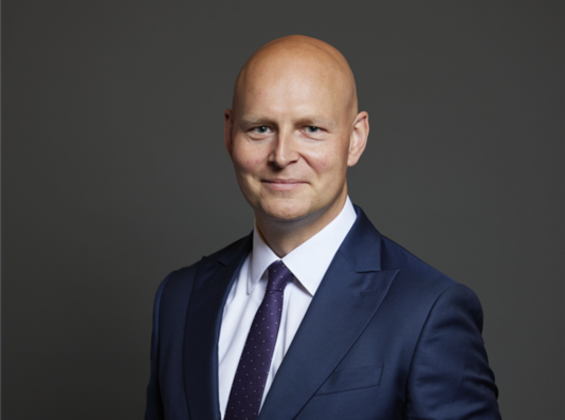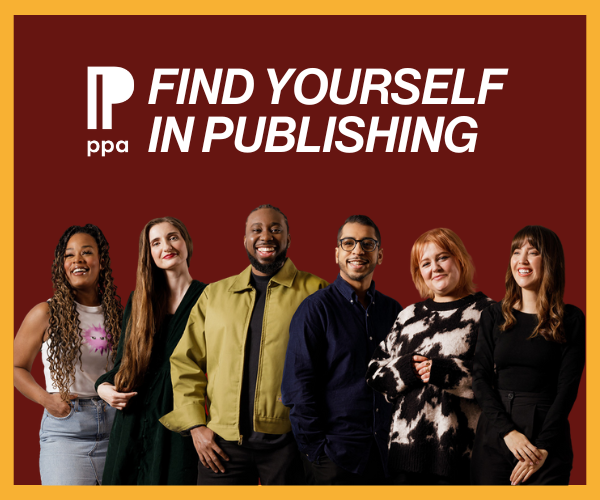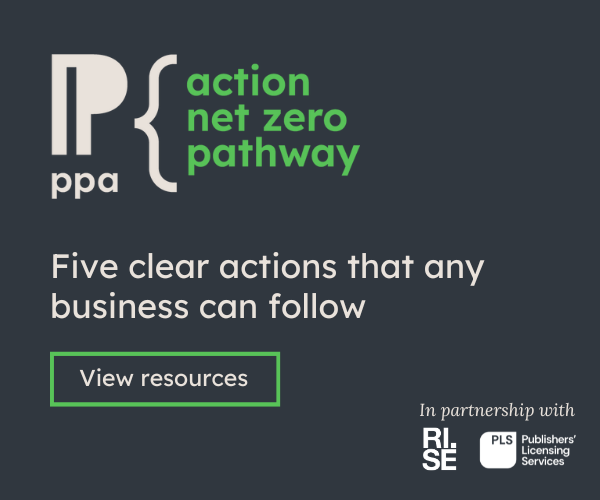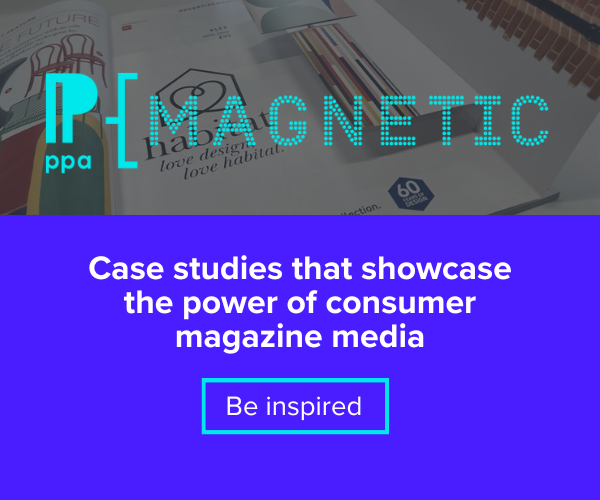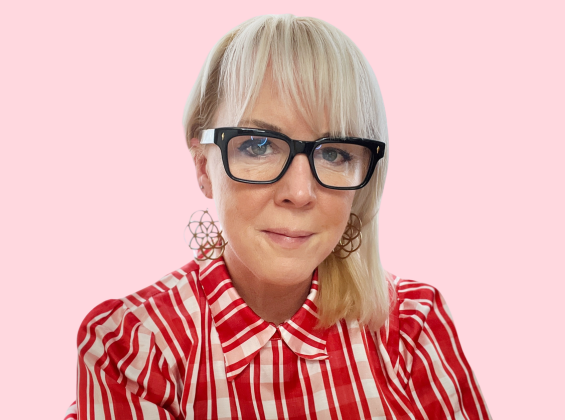
What made you want to work in the magazine industry?
I tried a few roles before I knew there was something beyond being Editor or Stylist in magazines. As soon as I realised that I could combine my love of fashion and imagery with business acumen in media, I was in. Sold.
When I was younger, we always had magazines around. Interestingly, it was Pattern magazine that I would always look at. My grandmother used to sew and create these fantastic dresses from nothing, making magic from a piece of cloth. The reference images in pattern books were always glamorous ladies wearing gloves and hats. That led me to start collecting old magazines. I have some great ones from the 50s and 70s. I just have always had a love of them.
This graduated into a fascination around current magazines and the content, so I’ve always collected them. It would be great if they were deemed valuable in pounds, but they’re worth so much to me personally that it really doesn’t matter.
Can you chart your journey from when you started out to your current position?
When I went to university, I didn't know what a Publisher actually was or did. It's serendipity that I studied management and sociology, because as a Publisher, I am calling on those lessons a lot – decades after leaving university.
Magazines are about society, reflecting what's going on and being tapped into the zeitgeist. Social trends and shifts in behaviour have always been really interesting to me, hence the sociology studies. My sister is a brilliant Sociologist and a Professor at Oxford University. She’s one of my inspirations.
My degree was also really useful for the management side of things. It helps me in managing the business of British Vogue in its scale and complexity. I studied and then I worked in retail for a bit. I worked for MatchesFashion.com, which was incredible. I learnt a lot from its then owners, Tom and Ruth, whom I still see today.
I moved from there to working in events, which I loved. Then a friend of mine, Kirsty Cocker, who actually works for Condé Nast now [as Associate Publisher at Brides and Condé Nast Traveller], said I’d be great in media. She gave me some great tips and I eventually got a job at the London Evening Standard, which led on to magazine publishing.
What's been the most exciting aspect of being involved with British Vogue?
What's happening at British Vogue now will be one of those where I tell future generations, "I was there." As consumer behaviour has changed so much, the way we work in the media industry needs to be significantly different. It's incredible to be at Vogue at a time where we're really embracing that and succeeding at showing how you can produce super aspirational luxury content that is part of the zeitgeist and has a lot of cultural importance and significance. Something being exclusive doesn't mean that it needs to be excluding, so it’s really incredible to be a part of that shift.
In addition to our huge digital revenue growth this year, it's been phenomenal for us to see the power of print again. When I had just been appointed, Edward's [Edward Enninful, Editor-in-Chief of British Vogue] first issue, the December 2017 issue, was coming out and he asked me to join him for a signing of the print issue. The queue literally wrapped around the building. That issue caused such a stir, because it was selling out everywhere and people desperately wanted to get their hands on it. We were offering digital editions, but what people really wanted was print, based on "the newness."
A small part of me feared that that would be a one off, but I knew I had to be a part of keeping that momentum going. With our new strategy, sales press coverage excitement has actually increased. The print issue is driving so much excitement – it’s the anchor to all else we do in digital social experiential. Our circulation is strong and I hope that’s good for the wider industry. We’re here to stay!
Do you have a go-to work outfit?
The pressure at Vogue is on another level – you’ve seen The Devil Wears Prada! I have quite a broad wardrobe. What I tend to do on a Sunday evening is put together five outfits. I have a little rail in my spare room for them. As the week goes on, I adapt or change the looks based on the weather change, my mood or different meetings or dinners that enter the calendar, but it means that I have something I know I'm going to feel confident in, if all else fails. We work long days and if I'm short on time, it takes away one of these extra things to think about. If you see me in all black, there was some sort of time or wardrobe malfunction or deliberations.
What do you turn to when you’re on deadline – tea/coffee/snacks?
We’re always on deadline now. A big part of my role is about building Vogue’s digital revenues. It’s going so well (up 155% year-on-year to date) so every day is a deadline day. A more holistic, long-term maintenance strategy is essential now – no sugar highs or caffeine crashes. Work is a marathon, not a sprint.
I'm big on holistic supplements. I get teased a lot by the team for my green juices and matcha teas. I'm a big advocate of yoga for mental and physical preparation and maintenance. I don't drink coffee at all – it puts a plaster on things and you feel more awake, but the brain function is not right for me. I don't eat chocolate. It sounds disciplined, but the truth is I don’t like the taste of either, which helps!
What’s the most unusual situation you’ve found yourself in because of your job?
Vogue has been full of revelations. For example, I've been to Buckingham Palace several times in connection to work and it never gets dull. The most unusual thing is the variance, so one day I can be in an industrial park in some far-flung area of the country seeing a client to close a business deal. Then two days later, I might be at the home of someone unfeasibly fabulous and celebrated for a private dinner. That's where the wardrobe challenge comes in. What do you wear that segues from industrial park to London’s finest?
What would people be surprised to know about your job?
Since we live in an Instagram age, what we tend to do is post the most glamorous edits of our lives. I’m as guilty as anyone. I think people are surprised about how numbers-driven my job is. I spend most days pouring over a spreadsheet. That might be to do with sales and circulation of the magazine or advertising revenue and trends. Being very numerate is basically my day-to-day job. Although, it looks like I spend my time going to great parties (partly my fault), my job is ultimately about increasing British Vogue’s profit.
Walk me through your typical day.
The thing I like most is I don't have a typical day, but broadly speaking, I get up pretty early, usually between 5am and 6:30am. I try to do about 30 minutes of yoga and listen to a podcast. Vogue's podcast, Appearances with Film Director Steve McQueen, is so brilliant. I would say that, of course, but it really is.
It's a really clever concept and Steve is a British Vogue Contributor and the most brilliant collaborator. He plays on the notion that you are the only person who can't see yourself in the first person. You need a mirror or you need how other people perceive you in order to understand what your appearance is and whether you're attractive. Almost everyone will identify with at least one of the great people he interviews.
I try to start work ahead of the team and our clients, because once they are in, my time is pretty much theirs. I tend to have various internal meetings at Condé Nast and lots of external meetings, usually a lunch with a client, or with someone related to content. Branded content is the area of our business revenue that's growing the most. Almost every evening there's some sort of event or dinner, whether it be a store launch or a dinner to celebrate a brand.
What's coming up for Vogue?
As you can imagine, everybody wants the spoilers for Vogue! What I can say is that British Vogue will continue to push the boundaries and continue to represent more women intelligently. For us, the zeitgeist is really about taking chances, in ever more luxurious ways and normalising the marginalised. We’re proof that the media can be both inclusive and luxurious. The high taste level Vogue shows in this symbiosis is what affirms that British Vogue is THE fashion bible for our time.
If you didn’t have to sleep, how would you use the remaining hours in the day?
I feel like I don't sleep enough anyway, but I would love to read more books related to work. I've got stacks of books that I say I’ll read when I’m on holiday or when it comes to Christmas. I tend to read magazines in any down time to keep abreast.
I contributed to a HarperCollins book called Slay In Your Lane and everyone keeps saying, "I can't wait to get to your chapter" and I haven't actually read my part yet. I’ve read most of it, but not my contribution. I would finish reading that first.
I really love to cook, so I would cook even more. I get a huge sense of joy from it. I tend to cook mostly on the weekends and my partner cooks in the week.
What is the last photo you took on your phone (at time of interview)? Why?

I was on a pseudo work trip with Krug Champagne, one of our clients, recently. We did this incredible train journey with Michelin-starred chefs and Jools Holland was the conductor. We had various different stops along the way at these Thomas the Tank Engine-style stations where different musical acts performed. The last picture on my phone is of a bottle of champagne with the British countryside whizzing by.
What’s your guilty pleasure?
JOMO, the joy of missing out. I love nothing more than a Friday night in eating stodgy food and watching boxsets. You know that thing where somebody calls you and says, "I'm so sorry, but I can't do that drink anymore" and you sort of feign disappointment? I spend so much of my time socialising with amazing people that a treat for me is to be on my own! It helps keep the balance.
Whose phone number do you wish you had?
Very difficult, but Prince if he were still with us. I'm a huge Prince fan and he was the second ever concert I went to see. I listen to his music all the time and he would be a brilliant barometer of cool. He was also the king of shade and so would be good for those great one-liners on text.
What’s the worst piece of advice you’ve ever been given?
That I should become a Nurse from my Careers Adviser at school. If I hear good advice, I really hang on to it. If I hear bad advice, it can also drive me to disprove it. At school, I liked math, art and drama, and they did not know what to do with me. My mother was a brilliant Nurse – she got an MBE for her decades of midwifery. In the absence of understanding where I might fit in, they just said do what your mother did, despite my different interests. Lazy advice is worse than no advice.
In a way, it was good, because up to that point I thought that my career would somehow reveal itself to me or someone would help me see what path I needed to take. I realised I needed to figure it out for myself and this sparked a light in me.
What would people be surprised to know about you?
I'm full of surprises and "contradictions" – all part of being a woman today.
What would be in your Room 101?
Fake feminists. With what’s been going on in the media industry and the film industry, across all industries really, we've seen some incredible women become much more vocal. We still have a long way to go, but there have been some real shifts. Hopefully, this will lead to some more significant change in working practices.
I get slightly frustrated when people are not genuine and they jump on the bandwagon in order to look contemporary, to tick a box and to absolve the need to address real inequalities and challenges. It's really about action over words and images. You can see more long-term action when people and companies are making changes that help women in the workforce and help women in terms of having more seats at the table and properly acknowledge their ideas and achievements.
We really need to look at the division of labour at home and how work responds to that. Issues around child care and maternity affect all women, even those who don't have children. The perception of a woman being of child-bearing age can lead to her being held back as much as actually having a child and being assumed to be out of the game. Really talented women leaving the workforce to go and create a future generation is essential, but they are still often unwittingly held back on their return.
Introvert or extrovert?
Introvert.
Optimist or pessimist?
Optimist.
Film or television? What are you binge-watching at the moment?
Television – we have such great streaming at the moment. I love this series on Netflix called Explained. There's a brilliant one on exclamation marks. It's really good bite-sized TV for when you have 20-30 minutes. I also really love Glow on Netflix. It's great escapism.
Sweet or savoury?
Savoury. I don't really like desserts or chocolate, but I would murder a cheese board.
Morning person or night owl?
I'm naturally a night owl. When I was at university, I got all of my best work done at two in the small hours. However, managing a team means I have to be a morning person. I'm pretty jolly in the morning, despite that!
Tea or coffee?
Herbal tea.
Emojis – cool or cringey? Which emoji do you use the most?
Like everything, it depends on context. I'm quite happy with an emoji. I cringe a little bit when I get an emoji on the end of a business email. On text, it's definitely cool. I also love a gif. Some of my team and I have an Instagram gif group with a "chief gif dealer."
The one I seem to be using the most is the lady with the hands on her face, which is quite telling.
